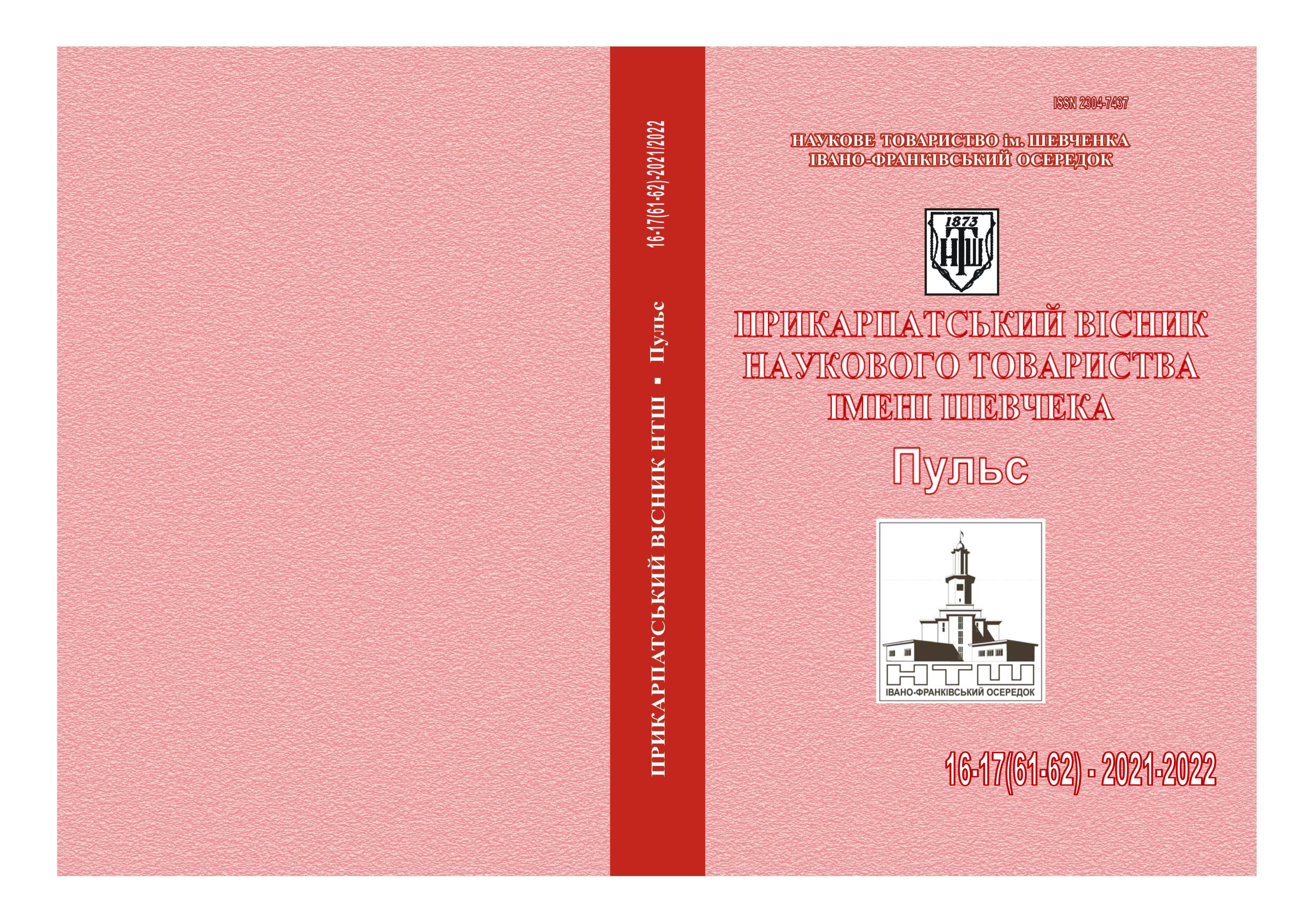MARKERS OF LOW-GRADE INFLAMMATION IN PATIENTS WITH ACUTE CORONARY SYNDROME AND 2 TYPE DIABETES MELLITUS
DOI:
https://doi.org/10.21802/2304-7437-2021-2022-16-17(61-62)-110-118Keywords:
diabetes, acute coronary syndrome, inflammation, leukocyte indices, C-reactive protein.Abstract
Cardiovascular diseases cause approximately one-third of all deaths in the world, of which 7.5 million deaths are estimated to be due to ischemic heart disease (IHD). Acute coronary syndromes (ACS) and sudden death cause most IHD-related deaths, which represent 1.8 million deaths per year. Established, that patients with diabetes mellitus (DM) are more likely to experience of ACS and heart failure and are at greater risk for dying after an acute cardiac event, than patients without diabetes.
The purpose of this study is evaluation of leukocyte and its populations count, leukocytes indices and plasma level of high sensitive C-reactive protein (hsCPR) in patients hospitalized due to ACS with or without of 2 type DM.
Material and Methods. We observed of 124 patients with ACS which were randomized into two groups: 1st group – 93 patients with ACS and DM; 2nd group – 31 patients with ACS without 2 type DM. 30 apparently healthy persons were included into control group. We studied of leukocytes count and their subpopulations in blood; calculated of their subpopulation indices: neutrophils to lymphocytes ratio (NLR), neutrophils to monocytes ratio (NMR), neutrophils to lymphocytes+monocytes ratio (N/LMR), lymphocytes to monocytes ratio (NMR) at admission. The plasma levels of hs-CRP were detected by ELISA method.
Results of study. The significant increase of white blood cells count and neutrophils count in patients with ACS at admission was detected in our study, especially in cases with DM. On the contrary, the counts of lymphocytes were decreased in patients with ACS and ACS with 2 type DM, versus data in control group. In patient with ACS the increased parameter of NMR was observed (p<0.001). Similarly, the following indices were higher, compared with control group parameters: NLR – for 3.32 times (in patients with ACS and DM) and for 2.43 times (in patients with ACS and without DM) (p<0.001); N/LMR – for 2.98 times (in patients with ACS and DM) and for 2.14 times (in patients with ACS and without DM) (p<0.001). On the contrary, LMR was decreased in both groups of patients with ACS – for 1.4 times and 1.36 times, respectively (p<0.05). The increased plasma levels of hs-CRP were detected in patients with ACS, more significant – in case of 2 type DM (fig. 1): for 2.1 times and for 2.59 times, respectively (p<0.001).
Conclusion. ACS is characterized of raised white blood cells and neutrophils count and low lymphocyte count, especially in cases of association with 2 type Diabetes Mellitus. Low-grade inflammation in patients with ACS and DM caused of increased levels of hs-CRP and some leukocyte ratios: NMR, N/LMR, NLR.
References
Oguntibeju O.O. Type 2 diabetes mellitus, oxidative stress and inflammation: examining the links. Int J Physiol Pathophysiol Pharmacol. 2019;11(3):45-63
International Diabetes Federation (IDF) Diabetes Atlas. 3rd edition. Brussels, Belgium: International Diabetes Federation; 2015
Sanchis-Gomar F, Perez-Quilis C, Leischik R, Lucia A. Epidemiology of coronary heart disease and acute coronary syndrome. Ann Transl Med. 2016;4(13):256
Dong X, Cai R, Sun J, et al. Diabetes as a risk factor for acute coronary syndrome in women compared with men: a meta-analysis, including 10 856 279 individuals and 106 703 acute coronary syndrome events. Diabetes Metab Res Rev. 2017; 33:e2887
Lettino M, Andell P, Zeymer U, et al., on behalf of the PIRAEUS group, Diabetic patients with acute coronary syndromes in contemporary European registries: characteristics and outcomes. European Heart Journal – Cardi-ovascular Pharmacotherapy. 2017; 3(4): 198–213
Budzianowski J, Pieszko K, Burchardt P, Rzeźniczak J, Hiczkiewicz J. The Role of Hematological Indices in Patients with Acute Coronary Syn-drome. Dis Markers. 2017;2017:3041565
Ibanez B, James S, Agewall S, Antunes MJ, Bucciarelli-Ducci C, et al; ESC Scientific Document Group. 2017 ESC Guidelines for the management of acute myocardial infarction in patients presenting with ST-segment ele-vation: The Task Force for the management of acute myocardial infarction in patients presenting with ST-segment elevation of the European Society of Cardiology (ESC). Eur Heart J. 2018 Jan 7;39(2):119-177
Collet JP, Thiele H, Barbato E, Barthélémy O, Bauersachs J, et al; ESC Scientific Document Group. 2020 ESC Guidelines for the management of acute coronary syndromes in patients presenting without persistent ST-segment elevation. Eur Heart J. 2020:ehaa575
Classification and Diagnosis of Diabetes: Standards of Medical Care in Diabetes – 2021. Diabetes Care 2021;44(1):S15–S33
Shah B, Baber U, Pocock SJ, Krucoff MW, Ariti C, Gibson CM, et al. White Blood Cell Count and Major Adverse Cardiovascular Events After Percutaneous Coronary Intervention in the Contemporary Era: Insights From the PARIS Study (Patterns of Non-Adherence to Anti-Platelet Regi-mens in Stented Patients Registry). Circ Cardiovasc Interv. 2017;10(9):e004981
Furman MI, Gore JM, Anderson FA, et al. Elevated leukocyte count and adverse hospital events in patients with acute coronary syndromes: findings from the Global Registry of Acute Coronary Events (GRACE). Am Heart J. 2004;147(1):42-48
Ertürk M, Turhan Caglar FN, Bıyık İ, et al. Correlations between hema-tological indicators and other known markers in acute coronary syndromes. EJCM. 2017; 05 (4): 67-74
Chao-Hui Dong, Zhang-Min Wang, Si-Yu Chen. Neutrophil to lympho-cyte ratio predict mortality and major adverse cardiac events in acute coronary syndrome: A systematic review and meta-analysis. Clinical Biochemi-stry. 2018;52:131-136
Gong S, Gao X, Xu F, et al. Association of lymphocyte to monocyte ratio with severity of coronary artery disease. Medicine (Baltimore). 2018;97(43):e12813
Kotyla PJ, Islam MdA, Engelmann M. Clinical Aspects of Janus Kinase (JAK) Inhibitors in the Cardiovascular System in Patients with Rheumatoid Arthritis. International Journal of Molecular Sciences.2020;21:7390

